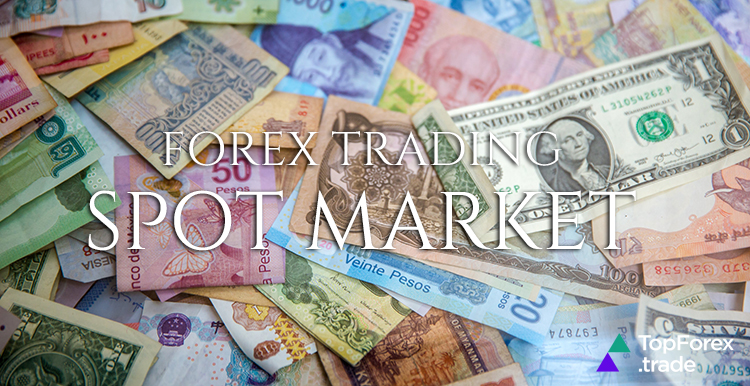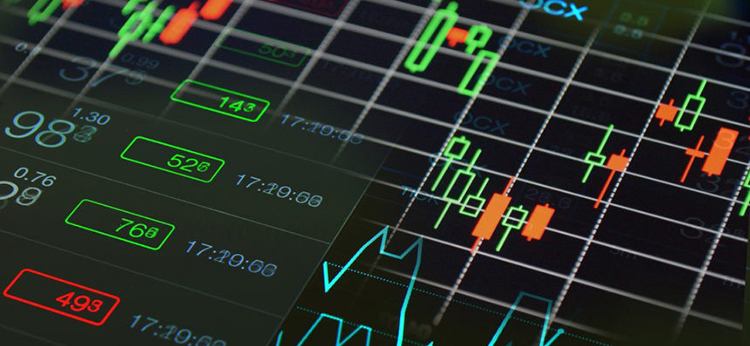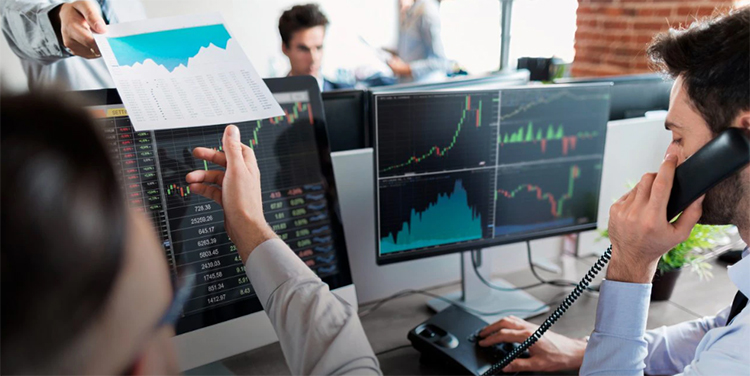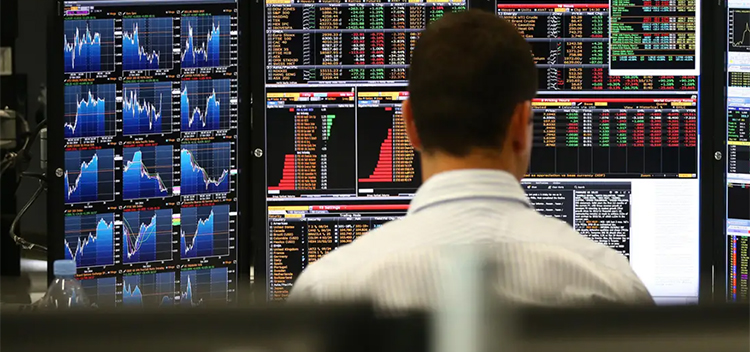What is Forex spot trading

For a long time the foreign exchange market, or Forex market, was only accessible to huge financial organizations. However, thanks to the wonders of today’s technology, retail FX trading has gained in popularity.
Yet, many people are still not so well acquainted with financial markets, which are perceived to be riddled with trading terminology. Among them, the FX spot market is one industry that frequently generates misunderstandings.
The Forex spot deal is an arrangement to trade currencies at the current rate, sometimes known as the cash rate, through a broker. Traders might win or lose money based on the difference in prices they buy and sell at with the potential to trade and profit in this 24-hour market whether prices rise or fall.
Respectively, an FX spot contract is one in which the trader commits to purchase or sell at the current exchange rate. An illustrious example of a spot currency transaction is going to the bank before a trip to the US and exchanging British pounds for US dollars as your money is exchanged at the current rate.
The same idea applies to other markets like stocks or commodities. For example, gold can be purchased on the spot, which means paying the current rate to obtain the metal right away.
Forex spot market terms explained

A currency agreement done for value on the spot is known as a spot deal, or trade-in the Forex market (largest of the foreign exchange markets, accounting for over 30% of trading activity) where currencies are purchased and sold against other currencies based on the current price.
In a spot trade, the two parties agree on an exchange rate and an amount on the transaction date for currency exchange to occur on the spot value date. When the agreed-upon spot value date approaches, one party sends the agreed-upon amount of one currency to the other party and receives the agreed-upon amount of the other currency.
The first amount, usually expressed in the base currency, is normally specified at the time of the spot transaction, while the second amount, usually expressed in the counter currency, is calculated using the agreed-upon exchange rate.
According to Forex market standards, spot value is normally set two business days from the transaction date for any currency pair except USD/CAD, which delivers in just one business day.
The spot exchange rate (the price at which currencies can be exchanged for value on the spot market) is the most actively traded, market-determined price at which a certain currency pair can be exchanged. It frequently changes significantly over time and typically carries the greatest uncertainties associated with trading.
The spot exchange rate is particularly important as it serves as the fundamental base for the pricing of nearly all foreign exchange derivatives, including Forex forwards, currency futures, and options. It is usually represented in terms of how many units of the counter currency are needed to buy one unit of the base currency.
Spot trading: Exchanges and OTC

Spot trade is not limited to a single location as people trade through exchanges, choose a reputable broker, or deal directly with others without using a third party.
Exchanges exist in 2 types: centralized and decentralized.
A centralized exchange oversees the trading of assets like Forex, Cryptocurrencies, and commodities, serving as a middleman between market players as well as a custodian of the exchanged assets. To use a centralized exchange, you must first verify your identity and fund your account.
A real controlled exchange must ensure that transactions run smoothly. Regulatory compliance, KYC (Know Your Customer) practices, competitive pricing, security, and customer protection are other duties. In exchange, the exchange charges transaction, listing, and other trading costs. As a result, exchanges can profit in both bull and bear markets, as long as they have a sufficient number of users and trading volume.
Another form of exchange that is typically seen with assets like Cryptocurrencies is a decentralized exchange (DEX). A DEX provides many of the same fundamental services as a centralized exchange, on the other hand, using blockchain technology to match buying and selling orders. Most DEX users do not need to register an account and can trade directly with one another without transferring assets onto the DEX.
On the other end of the spectrum, there is over-the-counter trading (OTC), often known as off-exchange trading where brokers, traders, and dealers act as market makers, quoting tradable Bid/Ask prices for financial assets and securities directly. Spot trading in the OTC market organizes trades using a variety of communication means, including phones and instant messaging.
Difference between futures and spot trading

Spots and futures are two ways to trade popular markets. The main distinction is in their prices and expiration dates.
The spreads on spot markets (also known as cash markets) are low, but commonly there are overnight costs and no expiration date. The futures market (sometimes referred to as the forwards market) offers wider spreads, and specified expiration dates in the future but no overnight costs. This makes spot markets more appealing to day traders while futures markets are usually preferred by long-term investors.
Let’s talk in detail about their 3 key differences:
Costs
Futures pricing is based on spot prices, but the linkage ends there as formers’ pricing mirrors the underlying asset’s expected supply and demand. For example, if crude oil market production has stagnated, this may imply future shortages, which might cause crude oil futures prices to surge.
A cost of carrying is also applied to futures pricing: it covers the cost of keeping the underlying asset until the moment of sale, as well as any interest or insurance expenses.
Duration and expiration day
The second distinction between the futures and spot markets is the time and the expiry of the deal. Spot markets are designed to allow deals to occur “on the spot.” as their price refers to the current market value of a specific asset and fluctuates in real-time based on market demand.
Futures markets, on the other hand, rely on contracts between traders to decide the price of the underlying at a future point. The price is agreed upon ahead of time, with the buyer hoping for a price increase over time and the seller hoping to exit with a profit.
Hedging and risk management
Hedging is the trading risk management practice of holding two or more positions at the same time in order to offset any losses from one with gains from the other. You might therefore hedge a spot position with a futures position. For example, if you feel the price of gold will fall, you may want to short your position in the gold markets by selling futures contracts. If you feel the price of gold will climb in the future, you may want to acquire and keep your position over time.
Benefits of spot trading
First, spot markets are the most liquid and feature the narrowest margins when compared to forward or futures markets.
Overnight credits can sometimes favor FX spot holdings if the currency held has a higher interest rate than the currency sold. For example, if you purchase the GBP/USD, you have purchased GBP and sold or exchanged it for USD. If the United Kingdom has a higher interest rate than the United States, you may receive a little credit into your account each day at 5 p.m. EST based on the interest rate disparity. If you possess the currency with the lower interest rate in the pair, you must pay the interest rate disparity every day.
Again, spot positions, unlike futures or forward contracts, have no expiry dates.
Trading charts are also continuous because the spot rate price does not expire and is ongoing. This can help with both Technical and Fundamental kinds of analysis because traders can observe years of price history. Futures and forwards charts, on the other hand, may only display a few months of price action.
Best Forex brokers for Forex spot trading
One of the most basic online trading segments, the FX spot market, accounts for the majority of daily turnover. Currency, securities, Cryptocurrencies, and commodities are exchanged for immediate delivery, as opposed to the futures market, where delivery is planned for a future date. Due to the time it takes to shift funds from one bank to another, settlement in the spot market often occurs two business days after the trade execution (except for the US dollar and Canadian dollar pair, as it settles the following business day).
Aside from the FX spot market, which trades over-the-counter, other exchange-traded spot markets include bonds and futures, commodities, and energy goods. Most commodities, however, are traded on the futures market for future delivery, with the majority of contracts being closed out before maturity and settled in cash.
It is common advice to remain with your native currency when entering the foreign exchange market because you’ll be better familiar with domestic political and economic affairs as they are constantly covered by news outlets and debated on social media, making it relatively simple to conduct Fundamental analysis.
To test your trading strategy with popular exchange pairings, use free demo accounts provided by reputable brokers, where you can find current market quotations for your spot deals and a selection of Forex trading indicators. Also, you’ll be able to observe currency pairings in real-time and become acquainted with the trading tools and terminology.
The Forex brokers listed below have been serving their clients for decades and adhere to the criteria of the world’s most demanding financial regulators, supporting the trade of currency pairs as well as other financial instruments like Cryptocurrency under some of the best trading conditions (various Forex bonuses, Social trading, Swap-free Islamic accounts, or free VPS services for extra-secure trading).
OANDA spot trading
OANDA is a well-known broker for traders worldwide. Among the more than 100 financial instruments available for trading are currency pairs, cryptocurrencies, indices, commodities, bonds, and metals. EUR, GBP, CHF, USD, CAD, AUD, JPY, HKD, and SGD are the broker’s nine basic currencies.
OANDA is regarded as one of the most reliable Forex brokers: it holds operating licenses in various countries and is a member of the regulatory bodies IIROC, FCA, and ASIC.
Furthermore, the broker generally offers three account types: demo, regular, and advanced trader, making it appropriate for both newbie and experienced traders. OANDA invites traders to put their talents to the test by opening a trial account with an unlimited amount of virtual money and an endless duration of use.
Plus500 CFDs spot trading
Plus500 has been in the market for over a decade and indeed provides CFDs for currency pairs, commodities, stocks, Indices, and Crypto, as well as a trading guide and all the tools required to make trading more effective and secure.
Plus500 clients can use a web terminal for PCs and laptops, as well as an Android and iOS mobile app with two types of accounts: real and demo. The second will provide an excellent opportunity for novice traders to practice, test their trading skills, and gain valuable knowledge in real-world market conditions while remaining fully risk-free.
Plus500 is a reputable Forex broker that is regulated by the UK Financial Conduct Authority, the Australian Securities and Investments Commission, the Cyprus Securities and Exchange Commission, and the New Zealand Financial Markets Authority. It is also a regulated financial services provider in South Africa, with a Financial Sector Conduct Authority license.
82% of retail investor accounts lose money when trading CFDs with this provider. You should consider whether you can afford to take the high risk of losing your money.
eToro spot trading
eToro is without a doubt one of the most popular brokers in the world, particularly in Europe. You can trade and invest in over 2000 different assets under the best possible conditions: low Forex and trading charges, as well as low minimum deposits. New digital currencies such as Bitcoin, Ethereum, and others have been added to the mix since 2017. Popular currency pairs, shares, Cryptocurrencies, commodities, ETFs, and indices are all available for you to trade with.
There are two sorts of accounts available at eToro: Retail and Professional Client. The first is immune to negative balance and includes a CopyTrader feature, whereas the second is known for its infinite leverage. Furthermore, newbies can always use a sample account to experiment with different trading strategies.
Because it has millions of clients globally, the broker is quite dependable, and it is backed by licenses that allow eToro to operate in a variety of countries while conforming to FCA, ASIC, and CySEC standards.
NAGA Markets spot trading
NAGA Markets is a highly rated broker that trades currency pairs (majors, minors, and exotic), stocks, ETFs, futures, commodities, and metals, among other asset classes. MetaTrader 4 and 5, as well as NAGA Webtrader, the broker’s original platform with mobile versions, are available for trading.
NAGA is a social trading network where clients of all skill levels may trade, share, and duplicate assets across over 950 different trading instruments. Tight spreads, minimal expenses, quick trade execution speeds, and a choice of adjustable account financing methods distinguish the broker’s trading circumstances.
To provide trading services to clients in numerous countries, the broker complies with many regulatory regulations around the world, including the FCA, CySEC, MiFID II, and MiFIR.
XM Group spot trading
XM Group is a global online Forex broker with over 1000 trading instruments, including over 55 currency pairs, metals, commodities, and equities that can all be traded on the MT4/MT5 platforms. The broker also provides a mobile app that allows you to trade in foreign markets with a single login, regardless of whether you’re using a demo or an actual account.
Furthermore, the broker offers a virtual private server (VPS) service, allowing clients to fully enjoy all of the benefits of trading with XM without having to be concerned about other elements that can impede or disrupt high-quality transactions, such as Internet connection speed or power outages.
One of the numerous advantages of the XM Group is that deposits and withdrawals are free of charge: the broker pays all payment system commissions. Micro, Standard, XM Ultra Low, and Shares are the most profitable trading accounts on unique terms with negative balance protection, good leverage, and tight spreads. The broker is regulated by CySEC, IFSC, DFSA, and ASIC to ensure the protection of traders worldwide.